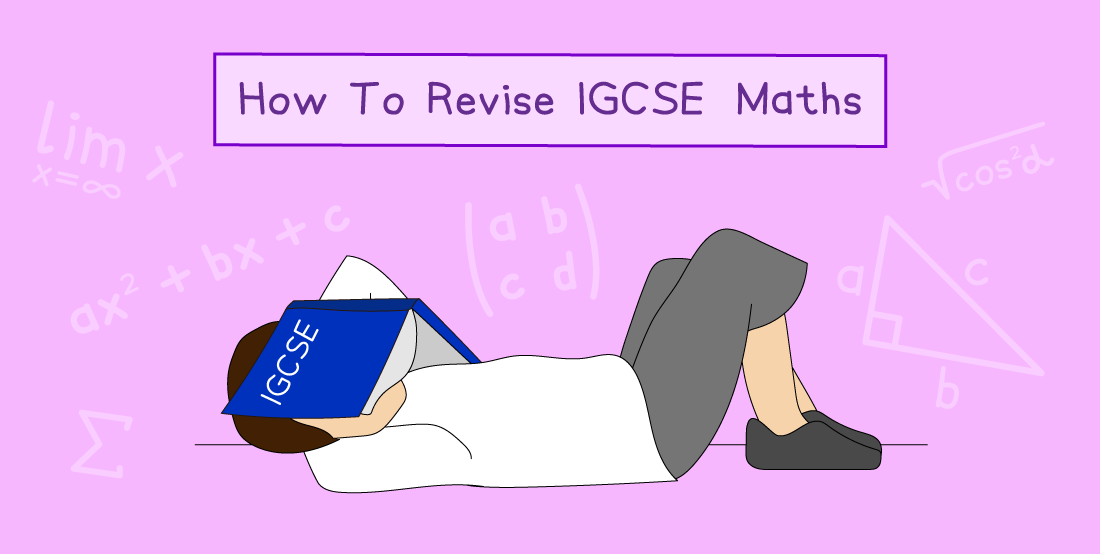Students regularly ask me how they can revise for IGCSE Maths. There is a myth that people either understand maths or they don’t. However, this is not the case! Anybody can get better at maths with the right kind of practice. In this article, I will be sharing my tips that I’ve gathered over 8 years of teaching, so that you know exactly how to revise IGCSE Maths effectively.
The techniques I am going to cover in this article are:
Know the syllabus
Master the basics
Learn how to use your calculator
Practise problem-solving questions
Revise regularly
Teach others
Ask questions when needed
Complete full past papers
Revising for IGCSE Maths effectively
1. Know the syllabus
Make sure you read the syllabus for your course (CIE 0580, CIE 0607 or Edexcel Maths A). The syllabus tells you exactly what you could be tested on. I make my students print out the relevant part of the syllabus and put it at the front of their folder. Our revision notes and exam questions use a structure which is very similar to the syllabus to make revision even easier for you.
If you use a textbook, then be aware that the topics might appear in a different order to our resources or the syllabus. This is because a textbook is designed to be used when you are being taught the material. Whereas, our resources are designed to help you revise effectively.
2. Master the basics
Most students think they should spend all their time revising the harder topics, such as surds and circle theorems. While you should spend some time on these topics, you also need to ensure that you master the basics, such as prime factor decomposition and solving equations. I’ve had students in the past who have missed out on a grade by a couple of marks. And when we’ve looked at their papers, they have made silly mistakes on the earlier, easier questions.
My advice to you is to start your IGCSE Maths revision sessions off with a quick 15-minute recall of the basics. You could use our flashcards to test yourself on these areas. You should practise exam questions on these topics every couple of weeks and aim to get as close to full marks as possible. Our questions, organised by topic, will help you as they contain fully explained answers so that you can see how to gain full marks.
3. Learn how to use your calculator
The exams also test how good you are at using your calculator. Therefore, as part of your revision, you should practise using your calculator. A lot of students lose marks in the exams by rounding the intermediate values in their working out. You should only round your final answers. You can store values in your calculator during a question, or you can use the answer button. Our revision notes cover the important tools that you need on your calculator.
4. Practise problem-solving questions
You can be sure that in your exams there will be problem-solving questions. This is a skill that you should definitely develop. There are some topics which tend to have more problem-solving questions, such as ratio and vectors.
The trick to these types of questions is to practise translating the given information into equations. I always hide the actual question and ask my students to work out anything they can from the information. For example, a question might have a triangle with missing angles and lengths, and ask the students to find a particular angle. In this case, I’d not tell my students which angle to find and see what they can find using the sine and cosine rules.
5. Revise regularly
Don’t leave revision until the week before your exams. I have seen some of my most able students miss out on the top grades because they assumed they could cram the night before their exams. It is best to revise regularly. I would advise doing some form of revision on most days of the week, and have one or two days off to recharge. You can read our advice about creating revision timetables to help you structure your studies.
6. Teach others
One of the most powerful forms of revision is to teach other people. This is because you have to make sure you fully understand a topic in order to help others. You could spend some of your revision sessions with your friends and take turns to teach each other. Alternatively, you could join online forums to help others struggling with maths questions.
7. Ask questions when needed
If you are struggling with a topic or question, then you need to address this. The first action you can take is to try to help yourself. You can read revision notes and watch videos. However, if you are still having difficulties, then you need to reach out and ask for help from someone else. You could ask your teachers, ask other students in your class or online, or you could ask AI to explain the topic to you.
If you don’t seek help, you might start to show signs of anxiety or stress. If you do start to feel anxious, then know that you are not alone. Our exam anxiety relief kit can help you.
8. Complete full past papers
Remember that you also need to practise exam technique skills as well as mathematical skills. These skills include: time-management, working under pressure, problem-solving and maximising the number of marks achieved.
Sometimes, getting the correct answer is not enough to get full marks. You might have to show your method in an algebra question or give reasons in a geometry question. The best way to know what the examiners want you to write is to practise past papers and read the official mark schemes. Here at Save My Exams, we have organised the past papers and mark schemes by year to help you structure your revision.
If you are studying for Cambridge CIE IGCSE Maths exams, then you will now need to sit non-calculator papers. You might be panicking about practising these questions, as all the past papers were calculator questions. However, we’ve got your back. We’ve made 3 sets of mock exams to help you practise all types of papers.
Improve Your Grades with Save My Exams
Save My Exams is here to help you achieve the best grade possible in IGCSE Maths by offering expert-written resources specifically made for your exam board. We’ve got everything you need:
Detailed revision notes
Exam-style questions with student-friendly worked solutions
Past papers with mark schemes
Whether you want to improve your understanding of key topics, test your knowledge, or sharpen your exam techniques, Save My Exams makes it easier and more effective for you to revise.
Explore Our IGCSE Maths Resources
References
How to make a GCSE Revision Timetable, Lisa Eades
85% of UK Students Experience Exam Anxiety, Jamie Undrell
Syllabus Cambridge IGCSE Mathematics 0580
Sign up for articles sent directly to your inbox
Receive news, articles and guides directly from our team of experts.

Share this article



 written revision resources that improve your
written revision resources that improve your